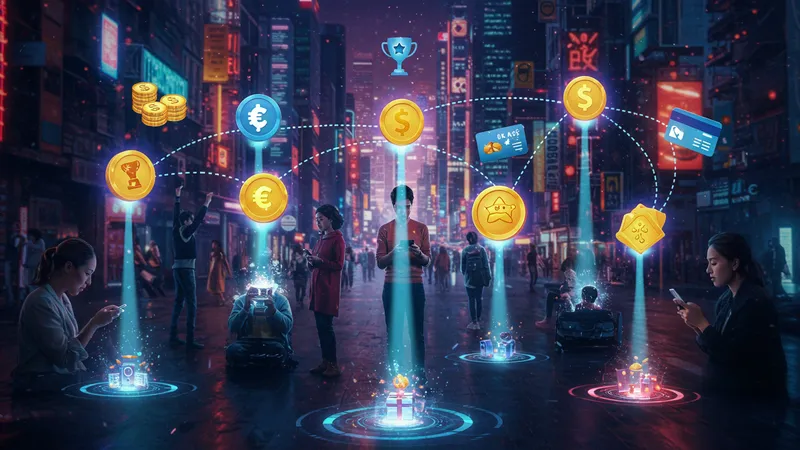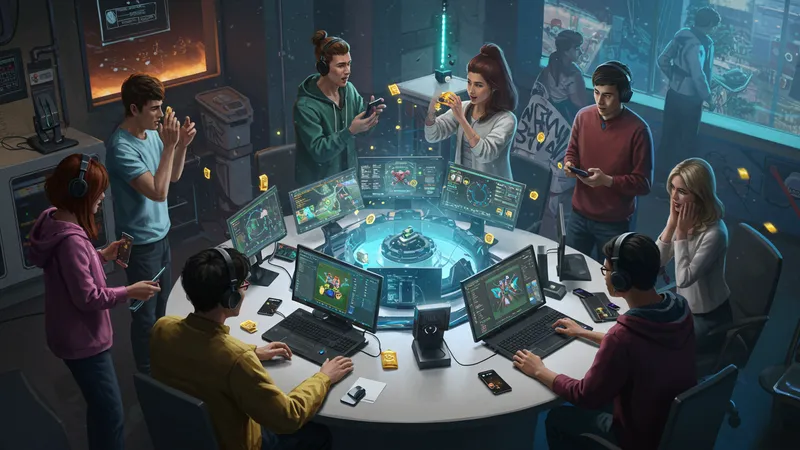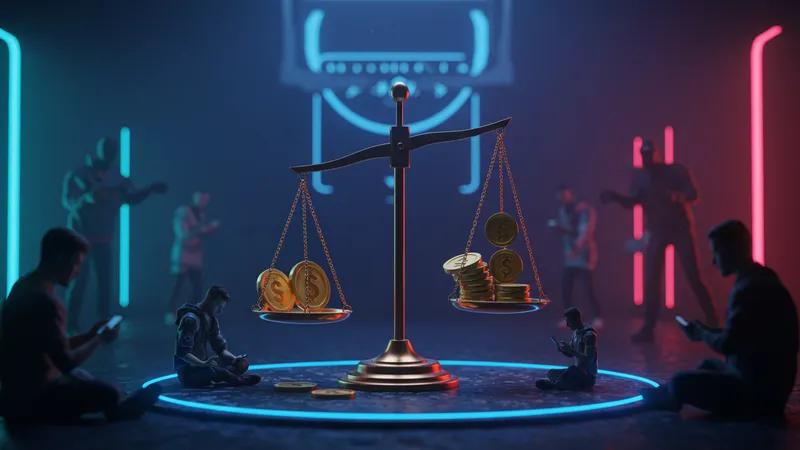

Imagine a world where playing mobile games becomes a lucrative venture not just for game developers but for the players themselves. Yes, mobile games with reward hooks are transforming the way we think about gaming.
This trend is exploding, fueled by innovations that allow players to earn real-life rewards. Right now, it's not just a passing craze but a fundamental shift you can't afford to ignore. Ready to dive in?

Most people dismiss mobile games as mere time-wasters. But what if I told you some gamers are cashing in on digital rewards, transforming hobby into side hustle? Picture this: players raking in hundreds of dollars worth of gift cards a year. But that’s not even the wildest part…
The shift is spurred by apps offering enticing, real-world prizes just for playing. But it's the unexpected impact on user engagement that has the industry talking. Experts are baffled by how these games keep players glued to their screens, making standard entertainment apps look primitive. But what happens next shocked even the experts…
Within the dynamic landscape of mobile gaming, disruptors have emerged not from tech CEOs, but from gamers themselves. Fueled by genuine feedback and community demands, these changes are nothing short of revolutionary. The industry's response? An acceleration towards games where rewards are woven into the experience itself. But the truth is, this was just the beginning.

With tech giants quick to adapt, the race to integrate reward hooks is fiercer than ever. The result? Games are not only more captivating but they also cultivate user loyalty in unprecedented ways. Players are sticking around longer and engaging deeper, creating a virtuous cycle of play and reward. And yet, you're about to learn something even more surprising.
Consider the last game you downloaded. Now, what if it's paying you in more than just entertainment? Hidden within this storyline is a fascinating intersection of gaming and e-commerce that few have realized. Yes, mobile games are becoming the next frontier of personal finance. And yet, there's another twist.
As mobile gaming continues to evolve, so does its influence on player behavior. The strategic inclusion of rewards has not only increased user acquisition but also nudged players to spend outside their usual patterns. What you'll read next might change how you see this forever.
Diving deeper into the mechanics, digital rewards in mobile games reveal a psychology-hacking formula that is as captivating as it is controversial. Players are drawn into the thrill of 'earning' through play, akin to the rush of gambling, but with less risk. This psychological blend is integral to why these games are overwhelmingly addictive. But behind that allure, there's more to uncover.

Insider reports suggest these reward mechanics were not initially intended to hook players but emerged as organic features that users clung to. This unintentional evolution redefined game design philosophy, making reward integration a competitive necessity. Yet, there's still an unseen aspect to this transformation.
Interestingly, reward-based mobile games are bridging demographics previously untouched by gaming. From stay-at-home parents to retirees, this expansion is reshaping the perceived 'gamer' stereotype. The universal language of rewards appeals across ages, redefining markets. And still, the surface is only beginning to be scratched.
The rapid adoption of this model hints at bigger implications for the gaming industry as well as individual lifestyle choices. Could mobile games with rewards soon change how you budget your leisure time and finances? What follows will delve into the depths of this possibility.
The world of reward-based mobile gaming has begun to influence players’ financial habits in surprising ways. For some, earnings from games have become a small yet significant addition to their monthly income. This supplementary cash flow is subtly transforming spending habits by encouraging users to save or invest their small winnings. And the ripple effects don't end there.

Survey data indicates that players who actively engage in reward-driven games are more likely to explore financial tools and apps. They become more financially literate as they optimize their gameplay earnings. This unforeseen educational angle has caught the attention of financial marketers. But there’s even more behind this trend.
Contrary to the stereotype of an isolated gamer, these reward-centric platforms are sparking lively communities. Players are sharing tips and strategies, and this community aspect further reinforces loyalty to the game. This symbiotic relationship benefits both players and developers and is geniously prolific. The next insight will be enlightening.
As new avenues for revenue emerge within this game model, so too do opportunities for partnerships with non-gaming brands. Brands are hungry to tap into these communities, seeing a fresh opportunity to connect with younger, tech-savvy audiences. What this will evolve into might surprise even seasoned marketers.
For all its enticing promises, reward-based mobile gaming hides challenges that players and developers must face. The potential for reward misuse or manipulation is a lurking concern, with occasional reports of fraudulent activities emerging. As players become more aware of these risks, the demand for transparency escalates. This ever-evolving landscape poses new dilemmas for the industry.

From a developer’s standpoint, maintaining the balance between attractive rewards and profitability is a constant tightrope act. Too generous, and they risk financial imbalance; too stingy, and players lose interest. Achieving this equilibrium is an ongoing process of adaptation and innovation, key to keeping players engaged. And the narrative continues to unravel.
Interestingly, the regulatory spotlight is starting to shine on these games. As the boundary between gaming and gambling blurs, lawmakers are examining how to protect consumers without stifling industry creativity. The implications of their decisions may redefine gaming norms. But within this legal framework, there's more at stake.
For players, the real challenge is maintaining a healthy relationship with these reward-based games. The fine line between entertainment and addiction becomes easily blurred when real-life rewards are involved. With that said, navigating these challenges successfully can lead to rewarding experiences both in and out of the game. What's next is an eye-opener.
In the quest to make games more rewarding, developers are turning to innovative models that keep players eagerly engaged. One such model involves integrating brand-sponsored challenges, where players complete specific tasks within a game for real-life rewards sponsored by major retailers. The potential blend of gaming and shopping has intrigued many. But that's just scratching the surface.

Consider gamified learning where educational platforms integrate game-like experiences to incentivize learning. Here, the reward extends beyond mere points and coins—students earn credits toward educational resources, creating double-value incentives. Such innovation has sparked a wave of enthusiasm in both tech and educational sectors. There's more to uncover here.
The evolution also extends to collaborative gaming, where players work together towards shared rewards. This fosters community spirit and interactivity on a whole new level. The shared achievements and benefits encourage deeper connections between players and a shared sense of accomplishment transcending digital platforms. The implications of this are profound.
It is noteworthy how mobile games with reward hooks are redefining engagement, not just within games but across personal and educational domains. Yet, this is not the limit of their transformative capability. The fusion of rewards and gaming continues to spawn unprecedented innovations. And what comes next could be revolutionary.
The rewarding nature of mobile games subtly but powerfully shifts the psychological landscape of gaming. Rewards serve as a catalyst for dopamine release, creating a loop of satisfaction that ensures players keep returning. This plays into the intrinsic motivation of players, making them more engaged than traditional gaming models ever achieved. But there's a fascinating twist here.

There’s growing evidence that players involved in reward-based gaming show an increase in patience and strategic decision-making skills. The constant evaluation of risk and reward subtly educates players on cost-benefit analyses, a skill valuable beyond the confines of gaming. This unintended educational benefit is stirring interest among cognitive researchers, but there's more.
Some worry about the addictive potential of these games due to their rewarding nature. However, emerging guidelines propose how to design games that are rewarding yet responsible. The emphasis is on creating an enriching and balanced experience, avoiding the pitfalls of pure addiction. This approach could be far-reaching.
The complex interplay of psychology and gaming within rewards is driving an era of more conscious design practices. The potential to reshape not just gaming but player behavior at large is vast and remains largely untapped by developers. The next insight might redefine your understanding entirely.
The economic implications of reward-driven mobile games are far-reaching and often overlooked. Not only do they inflate user engagement but they also contribute significantly to the broader economic ecosystem. Players who earn monetary rewards often spend them back into the economy, translating digital achievements into tangible consumer power. And yet, there’s a hidden layer.

These games have driven a dynamic gig-like economy where players can augment their income streams. The creation of new income avenues fuels entrepreneurship as players use their earnings to fund new ventures or pursue personal goals. The cycle reinforces itself sustainably, offering more than simple entertainment. But there's more happening under the surface.
The way these reward systems tap into consumer psychology is generating new market researchers’ interest. By observing gaming behavior patterns, businesses gain insights into consumer preferences, refining product strategies outside of gaming. The crossover knowledge is reshaping marketing tactics across industries. And another surprising link exists here.
A range of tech and financial sectors can integrate these reward models to enhance customer experiences. The blend of entertainment with practical reward offers innovative ways to engage and retain customers outside traditional boundaries. This integration hints at a more interconnected digital economy. What follows might change your perspective entirely.
Amidst rising concerns over screen time, parents are finding solace in reward-based mobile games. These games transform passive consumption into active engagement, offering children incentives for accomplishments that align closely with goal-setting and skill development. It’s a new era where digital engagement aligns with parental values, but with a surprising impact.
The educational twist in these games amplifies prospects for learning through play. Many games incorporate elements of STEM education, offering children a chance to explore subjects through rewarding gameplay. Parents appreciate this dual-purpose time spent on devices, combining entertainment with learning. There's another angle here worth exploring.
Furthermore, the reward system cultivates a sense of financial literacy among young players. The process of earning and utilizing rewards teaches concepts like savings and spending, normally absent in digital entertainment. Parents see this immersion as foundational for financial responsibility. But what remains underappreciated is striking.
Balancing educational rewards without fostering dependency on devices is a nuanced challenge each family tackles differently. Yet, the potential for rewards to encourage productive screen time opens a dialogue about innovative, healthy device use among children and parents. The next insight could shift how technology fits into households considerably.
As we look towards the horizon of reward-based mobile gaming, the landscape is set for even more evolution. With technological advancements such as augmented reality and blockchain integration, games will offer even richer reward experiences. Imagine earning cryptocurrency or tokens with actual market value. This potential alone is breathtaking, but what else could future hold?

The ongoing collaboration between game developers and brands will only deepen, leading to innovative reward systems tied to real-world products and services. With targeted collaboration, players could see rewards customized to their preferences, enhancing personal engagement like never before. The possible outcomes are astonishing.
Looking further into the future, games may evolve beyond individual experiences into societal contributions, linking gameplay to environmental or social achievements, where players contribute to charities through their rewards. This charitable integration could pioneer a more connected digital community, ushering in unparalleled societal shifts. And there's more on this trajectory.
The trajectory reward games are on suggests a paradigm where gaming’s integration into daily life is seamless, yet extremely beneficial. As experiences diversify, so will the implications for entertainment, social dynamics, and even lifestyle planning. The future might not only be endless but deeply transformative.
While the impact of reward-based games continues to unfold, one question remains: how will these games change your leisure time? The blend of entertainment and real-life gains creates a compelling case for rethinking how we define productive entertainment. Could games become legitimate contributors to leisure-driven productivity, savings, or even earnings? The possibilities are expanding with each development.

This shift towards more purposeful downtime is not just a personal revolution; it’s a cultural movement. As society becomes increasingly digital-focused, receptive to these rewarding experiences, potential shifts in collective behavior are on the horizon. Could we be witnessing the fusion of leisure and work in a novel way? Much remains to be realized.
As this cultural evolution unfolds, your personal interaction with leisure and gaming will undoubtedly change. The liberty to choose how to engage with these experiences is as open and dynamic as the games themselves. The way we define entertainment, productivity, and even financial wellness may coalesce through gaming in ways previously unimaginable. Where does your leisure adventure lead you from here?
Indeed, the future of mobile games with reward hooks is not just promising—it’s transformational. As players, developers, and industries continue to explore and innovate, expect a future where gaming is not just for mere enjoyment but intertwined with real-world benefits, enticing us all to play differently. Now is your time to engage, discover, and evolve with this burgeoning trend.
The journey we explored together reveals more than just games—it unveils a vibrant new world impacting societies and economies globally. Whether through richer personal experiences, expanded financial avenues, or more profound societal shifts, reward-based mobile games are redefining what it means to play. Ready to transform your view on gaming? Share this revelation, bookmark it, and take your first step into this innovative frontier today.